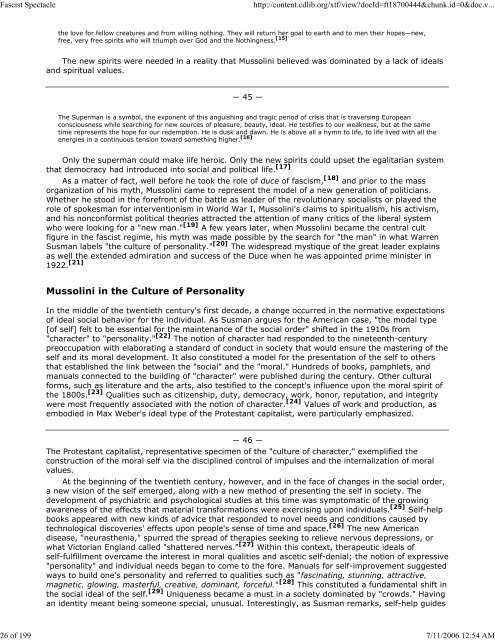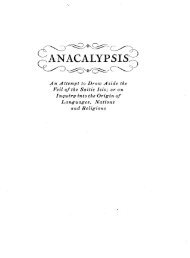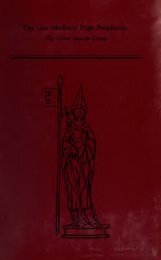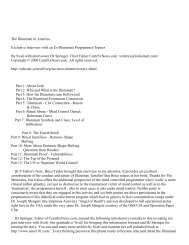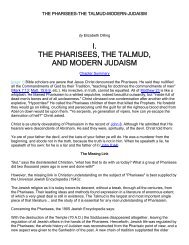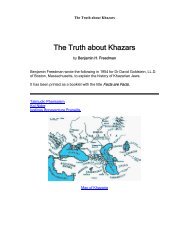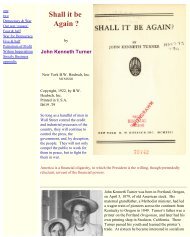Create successful ePaper yourself
Turn your PDF publications into a flip-book with our unique Google optimized e-Paper software.
<strong>Fascist</strong> <strong>Spectacle</strong> http://content.cdlib.org/xtf/view?docId=ft18700444&chunk.id=0&doc.v...<br />
the love for fellow creatures and from willing nothing. They will return her goal to earth and to men their hopes—new,<br />
free, very free spirits who will triumph over God and the Nothingness. [15]<br />
The new spirits were needed in a reality that Mussolini believed was dominated by a lack of ideals<br />
and spiritual values.<br />
― 45 ―<br />
The Superman is a symbol, the exponent of this anguishing and tragic period of crisis that is traversing European<br />
consciousness while searching for new sources of pleasure, beauty, ideal. He testifies to our weakness, but at the same<br />
time represents the hope for our redemption. He is dusk and dawn. He is above all a hymn to life, to life lived with all the<br />
energies in a continuous tension toward something higher. [16]<br />
Only the superman could make life heroic. Only the new spirits could upset the egalitarian system<br />
that democracy had introduced into social and political life. [17]<br />
As a matter of fact, well before he took the role of duce of fascism, [18] and prior to the mass<br />
organization of his myth, Mussolini came to represent the model of a new generation of politicians.<br />
Whether he stood in the forefront of the battle as leader of the revolutionary socialists or played the<br />
role of spokesman for interventionism in World War I, Mussolini's claims to spiritualism, his activism,<br />
and his nonconformist political theories attracted the attention of many critics of the liberal system<br />
who were looking for a "new man." [19] A few years later, when Mussolini became the central cult<br />
figure in the fascist regime, his myth was made possible by the search for "the man" in what Warren<br />
Susman labels "the culture of personality." [20] The widespread mystique of the great leader explains<br />
as well the extended admiration and success of the Duce when he was appointed prime minister in<br />
1922. [21]<br />
Mussolini in the Culture of Personality<br />
In the middle of the twentieth century's first decade, a change occurred in the normative expectations<br />
of ideal social behavior for the individual. As Susman argues for the American case, "the modal type<br />
[of self] felt to be essential for the maintenance of the social order" shifted in the 1910s from<br />
"character" to "personality." [22] The notion of character had responded to the nineteenth-century<br />
preoccupation with elaborating a standard of conduct in society that would ensure the mastering of the<br />
self and its moral development. It also constituted a model for the presentation of the self to others<br />
that established the link between the "social" and the "moral." Hundreds of books, pamphlets, and<br />
manuals connected to the building of "character" were published during the century. Other cultural<br />
forms, such as literature and the arts, also testified to the concept's influence upon the moral spirit of<br />
the 1800s. [23] Qualities such as citizenship, duty, democracy, work, honor, reputation, and integrity<br />
were most frequently associated with the notion of character. [24] Values of work and production, as<br />
embodied in Max Weber's ideal type of the Protestant capitalist, were particularly emphasized.<br />
― 46 ―<br />
The Protestant capitalist, representative specimen of the "culture of character," exemplified the<br />
construction of the moral self via the disciplined control of impulses and the internalization of moral<br />
values.<br />
At the beginning of the twentieth century, however, and in the face of changes in the social order,<br />
a new vision of the self emerged, along with a new method of presenting the self in society. The<br />
development of psychiatric and psychological studies at this time was symptomatic of the growing<br />
awareness of the effects that material transformations were exercising upon individuals. [25] Self-help<br />
books appeared with new kinds of advice that responded to novel needs and conditions caused by<br />
technological discoveries' effects upon people's sense of time and space. [26] The new American<br />
disease, "neurasthenia," spurred the spread of therapies seeking to relieve nervous depressions, or<br />
what Victorian England called "shattered nerves." [27] Within this context, therapeutic ideals of<br />
self-fulfillment overcame the interest in moral qualities and ascetic self-denial; the notion of expressive<br />
"personality" and individual needs began to come to the fore. Manuals for self-improvement suggested<br />
ways to build one's personality and referred to qualities such as "fascinating, stunning, attractive,<br />
magnetic, glowing, masterful, creative, dominant, forceful." [28] This constituted a fundamental shift in<br />
the social ideal of the self. [29] Uniqueness became a must in a society dominated by "crowds." Having<br />
an identity meant being someone special, unusual. Interestingly, as Susman remarks, self-help guides<br />
26 of 199 7/11/2006 12:54 AM


